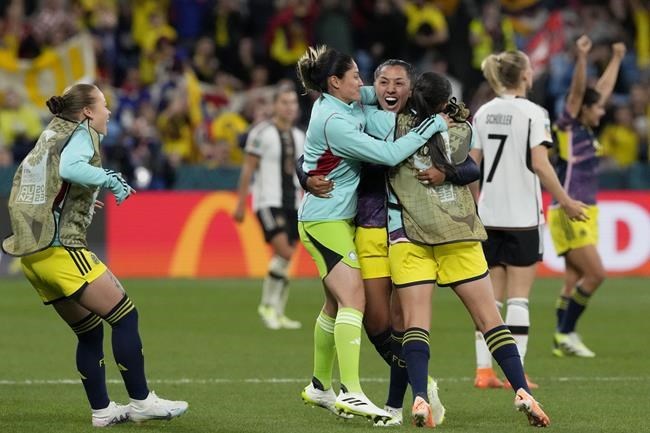MELBOURNE, Australia — While Olympic champion Canada has exited the FIFA Women's World Cup after the group stage, 16 teams are still in contention.
The expanded 32-country tournament already boasts record ticket sales, improved prize money and new faces. A look at five things from the 2023 World Cup in Australia and New Zealand.
DEPOSIT TIME
Canada's early exit at the tournament will not help Canada Soccer's bottom line as much as it no doubt hoped.
According to FIFA, participating member associations whose teams do not survive the group stage each receive US$1.56 million from the world governing body to "support football development in their countries."
That rises to US$1.87 million for reaching the round of 16, US$2.18 million for making the quarterfinal, US$2.455 million for fourth place, US$2.61 million for third, US$3.015 million for second and US$4.29 million for winning it all.
Player payments come out of that prize money with FIFA suggesting a range of base payments per athlete from US$30,00 for those exiting after the group stage to US$270,000 per player on the champion team.
Some federations have their own payment structure in place so the actual player payments will differ. The Canadian women struck an interim labour deal with Canada Soccer during their stay in Australia that covers compensation for both 2023 and the tournament. Terms of the agreement were not released.
In addition to the prize money, each of the 32 competing teams received some US$960,000 in preparation money for use ahead of the tournament.
The FIFA payday goes to Canada Soccer and not Canadian Soccer Business, which handles its marketing and sponsorship.
FIFA notes that the US$152 million in total compensation at this year's women's tournament, which including the prize money plus preparation payments for the 32 teams and compensation paid to clubs, is three times more than what was on offer four years ago in France and more than 10 times the amount offered at the 2015 tournament in Canada.
But it is still well short of what the men get.
The total prize pool at last year's 32-country tournament in Qatar was US$440 million with the teams failing to advance out of the group stage like Canada — those finishing 17th through 32nd — each receiving US$9 million.
Argentina, as winner, collected US$42 million in prize money.
The Canadian men, also in a bitter labour dispute with Canada Soccer, say they have yet to see any of the Qatar prize money.
In addition, all 32 men's entrants were given US$1.5 million ahead of the tournament to cover preparation costs.
FIFA president Gianni Infantino has said the world governing body's goal is to have equal prize money at the 2026 men's and 2027 women's World Cups.
---
THE OFFICIAL WORD
The decision to have referees announce the result of video reviews has been a hit to date at the tournament.
It has added a degree of drama with fans in the stands waiting to hear the verdict. The practice was first used earlier this year at the FIFA Club World Cup in Morocco and the Men's U-20 World Cup in Argentina.
FIFA says the objective is to help fans in the stadium and TV viewers understand what is going on with referees announcing the play in question, the outcome and the reason why.
The announcement in English are made through a microphone linked to the PA system with some referees handling the language better than others.
---
MAKING THEIR MARK
Haiti, Ireland, Morocco, Panama, Philippines, Portugal, Vietnam and Zambia have been welcome additions to the women's tournament.
The 46th-ranked Philippines shocked No. 26 New Zealand while No. 72 Morocco upset No. 17 South Korea, both by 1-0 scores. No. 77 Zambia downed No. 36 Costa Rica 3-1.
No. 53 Haiti lost its first two games against No. 4 England and No. 14 China, but only by 1-0 scores. No. 22 Ireland gave No. 7 Canada and No. 10 Australia all they could handle, before falling 2-1 and 1-0 respectively.
And 25th-ranked Colombia, in its third trip to the tournament, recorded a shock 2-1 win over No. 2 Germany. It was just the Germans' second loss time in 26 Women’s World Cup group-stage matches and first since a 3-2 loss to Sweden in 1995.
FIFA says of the 17 teams that previously made their Women’s World Cup debuts this century, 11 failed to win a match at their debut tournament. Only three survived the group phase to make the knockout rounds — with Switzerland, the Netherlands and Cameroon moving on in 2015 in Canada.
---
MILESTONE GOAL
Zambia's Barbra Banda scored the tournament's 1,000th goal, converting a penalty in Monday's 3-1 win over Costa Rica in Hamilton.
FIFA says the milestone came 31 years eight months 15 days after China's Ma Li scored in a 4-0 win over Norway in the opening match of the inaugural 1991 tournament.
---
CANADA BY THE NUMBERS
In leading Canada out against Australia on Monday, captain Christine Sinclair made her 23rd Women's World Cup start which equals retired American Joy Fawcett for second-most in tournament history.
American Kristine Lilly, also retired, tops the list at 29.
It marked the sixth World Cup for the 40-year-old Sinclair, with veteran midfielder Sophie Schmidt taking part in her fifth tournament. Canadian goalkeeper Kailen Sheridan, defender Vanessa Gilles, midfielder Julia Grosso and forwards Cloe Lacasse, Olivia Smith and Evelyne Viens made their World Cup debuts.
---
Follow @NeilMDavidson on Twitter
This report by The Canadian Press was first published Aug. 1, 2023
Neil Davidson, The Canadian Press


